|
Onderweg naar een militaire confrontatie met Iran
Door Daan de Wit
De situatie in Irak, de financiële crisis of de olieprijzen zijn niet in staat de kwestie Iran naar de achtergrond te drijven. De dreiging van een conflict met Iran blijft bovenaan de agenda staan. Slechts deels wordt deze 'drumbeat for war' gevoed door artikelen van Fox News als 'U.S. Officials Begin Crafting Iran Bombing Plan' of de door Fox zaterdag te vertonen reportage Iran: Ticking Bomb. Voormalig veiligheidsadviseur voor president Carter, Zbigniew Brzezinski, zegt in een CNN-interview met Wolf Blitzer dat 'the president and particularly the vice president are trying to hype the atmosphere', waarmee hij overigens duidelijke verbanden ziet in de aanloop naar de oorlog met Irak. De Russische buitenlandminister Lavrov zegt dat de 'Numerous reports on the possible implementation of military action against Iran are causing concern'. Hij doelt hiermee mede op de uitspraak van zijn Franse collega Bernard Kouchner die eerder zei: 'We have to prepare for the worst, and the worst is war'. Kouchner verduidelijkte zijn uitspraak later: 'I'm not in favor of war with Iran, I want to prevent the war'. Irans president Ahmadinejad zegt in een recent interview: 'It's wrong to think that Iran and the US are walking towards war. Who says so? Why should we go to war? There is no war in the offing.' Intussen toont Iran de nieuwe Ghadr-1-raket die een bereik heeft van 1800 kilometer, 'sufficient to put US bases in the Middle East and Iran's arch enemy Israel within reach.' 'This constant drum beat of conflict is what strikes me which is not helpful and not useful', aldus admiraal William Fallon, de baas van USCentcom. Hoeveel kans heeft de diplomatie van Rice werkelijk gekregen? In tegenstelling tot de aanloop naar de oorlog met Irak, lijkt het erop dat de factie van buitenlandminister Rice voor diplomatie tijd heeft gekregen die beschikbaar was vanwege de situatie in Irak en moest worden gebruikt om de geesten verder rijp te maken voor een nieuwe oorlog, ditmaal tegen Iran. Inmiddels staat Iran weer bovenaan de agenda en lijkt de kans dat Iran niet zal worden aangevallen onooglijk klein. 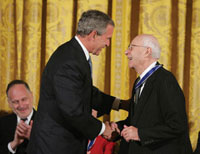 De vraag is hoeveel kans Rice heeft gehad. Dat die mogelijk niet heel serieus is geweest, is mede af te leiden uit de opmerkingen van een van de belangrijkste neoconservatieven, Norman Podhoretz. Hij wilde graag een gesprek met de president en Karl 'the architect' Rove en kreeg dat dus; gedurende drie kwartier luisterden zij aandachtig naar hem: '“I did say to [the president], that people ask: Why are you spending all this time negotiating sanctions? Time is passing. I said, my friend [Robert] Kagan wrote a column which he said you were giving ‘futility its chance.' And both he and Karl Rove burst out laughing. “It struck me,” Podhoretz added, “that if they really believed that there was a chance for these negotiations and sanctions to work, they would not have laughed. They would have got their backs up and said, ‘No, no, it's not futile, there's a very good chance.' [...] Podhoretz said he believes that “Bush is going to hit” Iran before the end of his presidency. His assumption is based on intellectual instinct.' De auteurs van een analyse van de situatie met Iran, schrijven: 'We should not underestimate the Bush administration's ability to convince itself that an "Iran of the regions" will emerge from a post-rubble Iran. So, do not be in the least surprised if the United States attacks Iran. Timing is an open question, but it is hard to find convincing arguments that war will be avoided, or at least ones that are convincing in Washington.' De vraag is hoeveel kans Rice heeft gehad. Dat die mogelijk niet heel serieus is geweest, is mede af te leiden uit de opmerkingen van een van de belangrijkste neoconservatieven, Norman Podhoretz. Hij wilde graag een gesprek met de president en Karl 'the architect' Rove en kreeg dat dus; gedurende drie kwartier luisterden zij aandachtig naar hem: '“I did say to [the president], that people ask: Why are you spending all this time negotiating sanctions? Time is passing. I said, my friend [Robert] Kagan wrote a column which he said you were giving ‘futility its chance.' And both he and Karl Rove burst out laughing. “It struck me,” Podhoretz added, “that if they really believed that there was a chance for these negotiations and sanctions to work, they would not have laughed. They would have got their backs up and said, ‘No, no, it's not futile, there's a very good chance.' [...] Podhoretz said he believes that “Bush is going to hit” Iran before the end of his presidency. His assumption is based on intellectual instinct.' De auteurs van een analyse van de situatie met Iran, schrijven: 'We should not underestimate the Bush administration's ability to convince itself that an "Iran of the regions" will emerge from a post-rubble Iran. So, do not be in the least surprised if the United States attacks Iran. Timing is an open question, but it is hard to find convincing arguments that war will be avoided, or at least ones that are convincing in Washington.'Militaire voorbereidingen voor een aanval op Iran Het militaire apparaat van de VS is goed voorbereid op een aanval op Iran. Naast de militaire plannen van USStratcom (uit te voeren door USCentcom), gemaakt om een aanval op Iran te anticiperen, blijkt er nu ook Project Checkmate te zijn. 'Checkmate's role is to develop the necessary expertise so that “if somebody says Iran, it says: ‘here is what you need to think about'. Here are the objectives, here are the risks, here is what it will cost, here are the numbers of planes we will lose, here is how the war is going to end and here is what the peace will look like”'. Checkmate heeft zijn nut al bewezen in het verleden: 'Project Checkmate, a successor to the group that planned the 1991 Gulf War's air campaign, was quietly reestablished at the Pentagon in June. [...] It was revived under Colonel John Warden and was responsible for drawing up plans for the crushing air blitz against Saddam Hussein at the opening of the first Gulf war.' Het is speculatief om over verbanden te spreken, maar genoteerd moet worden is dat in termen van een oorlog tegen Iran meestal wordt gesproken van een luchtaanval. The Raw Story schrijft over de studie Considering a war with Iran: A discussion paper on WMD in the Middle East: 'Most significantly, Plesch and Butcher [in their report] dispute conventional wisdom that any US attack on Iran would be confined to its nuclear sites. Instead, they foresee a "full-spectrum approach," designed to either instigate an overthrow of the government or reduce Iran to the status of "a weak or failed state." Although they acknowledge potential risks and impediments that might deter the Bush administration from carrying out such a massive attack, they also emphasize that the administration's National Security Strategy includes as a major goal the elimination of Iran as a regional power.' Ondanks dat het niet verstandig om een tijdstip te plakken op een gebeurtenis van een dergelijke omvang, toch kan het interessant zijn kennis te nemen van dit bericht van persbureau UPI, van medio dit jaar: '[...] a well-informed source tells United Press International that according to senior U.S. intelligence officials, President Bush has definitely decided not to strike any of Iran's alleged nuclear weapons production facilities this year. The sources say the officials stressed the words "this year," meaning in 2007. That, however, does not rule out the possibility of military intervention in 2008, right until January 2009, when Bush's term in the White House comes to an end. This information seems to back up a report published in the July 16 issue of the London Guardian that claims President Bush gave in to Vice President Dick Cheney, accepting to carry out military action against Iran before he leaves office.' Oorlog met Iran in belang extreme facties, zowel in VS als Iran Eerder in deze serie ging het onder de kop De tweeling Bush/Ahmadinejad aan de hand van een inzichtelijk artikel van neocon-watcher Jim Lobe, getiteld Ahmadinejad and Bush: Separated at Birth?, over de opvallende gelijkenissen tussen beide leiders. Steve Clemons, expert op het gebied van het Amerikaanse buitenlandbeleid, trekt deze gedachte door in zijn analyse van de situatie met Iran: '[...] I do worry about the Cheney gang and the [Iran Revolutionary Guard Corps]/Ahmadinejad 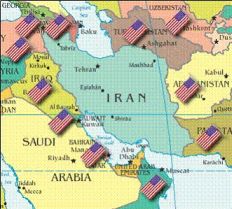 crowd in Iran trying to precipitate a spark that produces a very fast escalation that circumvents most of Bush's national security decisionmaking structure -- and that kind of war is something we should worry about. That's what I think could happen. [...] It would most likely be triggered by one or both of the two people who would see their political fortunes rise through a new conflict -- Cheney and Iranian President Mahmoud Ahmadinejad."' Beide mannen ontlenen hun machtspositie aan een conflictueuze situatie met 'de ander'. Vandaar het het niet zo vreemd is dat Dick Cheney in mei 2003 de poging tot vredesbesprekingen door Iran saboteerde. En: 'For his part, Ahmadinejad believes Iran's potential to become a dominant player in the Middle East and to see the flourishing of its Shi'ite Islamic revolution can only be achieved if Washington remains the bogeyman "Great Satan"', schrijft The Vancouver Sun. Voeg hierbij de informatie zoals te lezen onder de kop Fundamentalistisch leiderschap in zowel de VS als Iran in een eerder deel van deze serie van DeepJournal over Iran en er ligt een recept voor een rampzalige cocktail waarbij twee tegenover elkaar staande partijen voordeel zien bij een wederzijds conflict: 'President Ahmadinejad spiegelt de visie op de zogenoemde 'eindtijd' van de miljoenen christenenen die Bush steunen; net als hen ziet hij de toekomst niet al te somber in omdat ook hij een eindstrijd en vooral een verlosser voorziet [...]'. crowd in Iran trying to precipitate a spark that produces a very fast escalation that circumvents most of Bush's national security decisionmaking structure -- and that kind of war is something we should worry about. That's what I think could happen. [...] It would most likely be triggered by one or both of the two people who would see their political fortunes rise through a new conflict -- Cheney and Iranian President Mahmoud Ahmadinejad."' Beide mannen ontlenen hun machtspositie aan een conflictueuze situatie met 'de ander'. Vandaar het het niet zo vreemd is dat Dick Cheney in mei 2003 de poging tot vredesbesprekingen door Iran saboteerde. En: 'For his part, Ahmadinejad believes Iran's potential to become a dominant player in the Middle East and to see the flourishing of its Shi'ite Islamic revolution can only be achieved if Washington remains the bogeyman "Great Satan"', schrijft The Vancouver Sun. Voeg hierbij de informatie zoals te lezen onder de kop Fundamentalistisch leiderschap in zowel de VS als Iran in een eerder deel van deze serie van DeepJournal over Iran en er ligt een recept voor een rampzalige cocktail waarbij twee tegenover elkaar staande partijen voordeel zien bij een wederzijds conflict: 'President Ahmadinejad spiegelt de visie op de zogenoemde 'eindtijd' van de miljoenen christenenen die Bush steunen; net als hen ziet hij de toekomst niet al te somber in omdat ook hij een eindstrijd en vooral een verlosser voorziet [...]'.Dat door de elite in Iran niet per se met grote vreze wordt uitgekeken naar een oorlog blijkt ook uit de visie van William Pfaff, auteur van acht boeken over Amerika's buitenlandbeleid en columnist voor de International Herald Tribune. Onder de kop Why Iran's Revolutionary Guard Wants War with the U.S. schrijft Pfaff: 'Sources inside Iran [...] have described to this writer why leading figures 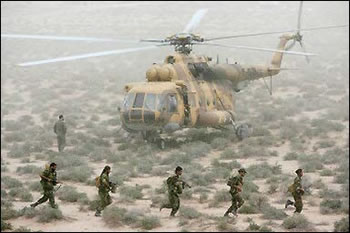 in the Revolutionary Guard believe that an attack on their country by America or Israel [...] would actually produce in political but also military terms a great victory for Iran and the Islamic cause, as well as serving the Revolutionary Guard's own organizational and political interests.' Volgens Pfaff ziet de Garde de Amerikaanse neocons en de Israëlische lobby in feite als medestanders bij het toebrengen van ernstige schade aan de VS. Pfaff schrijf verder: 'They believe they can apply to U.S. Naval forces measures of asymmetric warfare, using advanced technology, just as Lebanon's Hezbollah did last year in resisting Israel's ground intervention in Lebanon and destroying Israeli armor. Similar methods, applied by the insurgents in Iraq, have taken a severe toll in American vehicles, armor and troops.' Joseph Cirincione van het Center for American Progress voegt daaraan toe: 'It's going to be very hard to defend U.S. ships against small ships and volleys of missiles in the confines of the Persian Gulf'. Pfaff: '[...] If the U.S. were to break the world's six-decade nuclear truce since Hiroshima and Nagasaki, and use nuclear weapons against Iranian defenses, as Vice President Dick Cheney reportedly favors, these Iranian believe America would be left an international pariah.' in the Revolutionary Guard believe that an attack on their country by America or Israel [...] would actually produce in political but also military terms a great victory for Iran and the Islamic cause, as well as serving the Revolutionary Guard's own organizational and political interests.' Volgens Pfaff ziet de Garde de Amerikaanse neocons en de Israëlische lobby in feite als medestanders bij het toebrengen van ernstige schade aan de VS. Pfaff schrijf verder: 'They believe they can apply to U.S. Naval forces measures of asymmetric warfare, using advanced technology, just as Lebanon's Hezbollah did last year in resisting Israel's ground intervention in Lebanon and destroying Israeli armor. Similar methods, applied by the insurgents in Iraq, have taken a severe toll in American vehicles, armor and troops.' Joseph Cirincione van het Center for American Progress voegt daaraan toe: 'It's going to be very hard to defend U.S. ships against small ships and volleys of missiles in the confines of the Persian Gulf'. Pfaff: '[...] If the U.S. were to break the world's six-decade nuclear truce since Hiroshima and Nagasaki, and use nuclear weapons against Iranian defenses, as Vice President Dick Cheney reportedly favors, these Iranian believe America would be left an international pariah.'Olie als argument om Irak en Iran aan te vallen 'I cannot understand why we don't name what is evident and indeed a wholly defensible pre-emptive position', zegt voormalig voorzitter van de privébank Federal Reserve Alan Greenspan 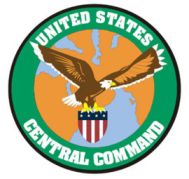 tegen The Guardian. Hij beschrijft in zijn nieuwe boek het publieke geheim dat het motief voor de oorlog tegen Irak was gelegen in de olie: 'I'm saddened that it is politically inconvenient to acknowledge what everyone knows: The Iraq war is largely about oil'. Greenspan beschrijft wat ik vanaf november 2001 schreef in mijn zevendelige serie over olie als een van de belangrijke redenen om Irak aan te vallen. Zonder veel omhaal schrijft USCentcom, het Amerikaanse commandocentrum dat aanvalsstrategieën uitvoert: 'The national interests outlined in the National Security Strategy and the objectives articulated in our National Military Strategy form the bases for the Central Command's objectives and supporting strategy. Primary among U.S. interests in the USCENTCOM AOR [Area of Responsibility] is uninterrupted secure access to Arabian Gulf oil.' Dit is trouwens een strategie die is ontwikkeld door veiligheidsadviseur Zbigniew Brzezinski voor de Democratische president Jimmy Carter en die de Carter Doctrine wordt genoemd. tegen The Guardian. Hij beschrijft in zijn nieuwe boek het publieke geheim dat het motief voor de oorlog tegen Irak was gelegen in de olie: 'I'm saddened that it is politically inconvenient to acknowledge what everyone knows: The Iraq war is largely about oil'. Greenspan beschrijft wat ik vanaf november 2001 schreef in mijn zevendelige serie over olie als een van de belangrijke redenen om Irak aan te vallen. Zonder veel omhaal schrijft USCentcom, het Amerikaanse commandocentrum dat aanvalsstrategieën uitvoert: 'The national interests outlined in the National Security Strategy and the objectives articulated in our National Military Strategy form the bases for the Central Command's objectives and supporting strategy. Primary among U.S. interests in the USCENTCOM AOR [Area of Responsibility] is uninterrupted secure access to Arabian Gulf oil.' Dit is trouwens een strategie die is ontwikkeld door veiligheidsadviseur Zbigniew Brzezinski voor de Democratische president Jimmy Carter en die de Carter Doctrine wordt genoemd.De originele benaming [video] van de aanval op Irak in 2003 was Operation Iraqi Liberation (OIL), voordat die werd hernoemd in Operation Iraqi Freedom (OIF). Een man met een gelijkwaardig statuur als Greenspan, Henry Kissinger, schrijft met betrekking tot de olie in feite hetzelfde als de voormalig FED-voorzitter, maar dan over Iran: '[...] an Iran that practices subversion and seeks hegemony in the region — which appears to be the current trend — must be faced with red lines it will not be permitted to cross. The industrial nations cannot accept radical forces dominating a region on which their economies depend, and the acquisition of nuclear weapons by Iran is incompatible with international security.' Over dat soort massavernietigingswapens gesproken, maar dan betrekking hebbend op de oorlog tegen Irak, zegt Greenspan: 'I thought the issue of weapons of mass destruction as the excuse was utterly beside the point'. Het is de vraag in hoeverre de geschiedenis zich gaat herhalen nu niet het olierijke Irak, maar het olierijke buurland Iran van het hebben of produceren van massavernietigingswapens wordt beschuldigd door dezelfde mensen die Irak zijn binnengevallen op basis van argumenten en beschuldigingen die, zoals ik achteraf, maar ook al tijdens beschreef, vals bleken te zijn. Onderzoeksjournalist John Pilger schrijft: 'The main reason was oil. [Former US treasury secretary Paul] O'Neill was shown a Pentagon document entitled Foreign Suitors for Iraqi Oilfield Contracts, which outlined the carve-up of Iraq's oilfields among the major Anglo-American companies. Under a law written by American and British officials, the Iraqi puppet regime is about to hand over the extraction of the largest concentration of oil on earth to Anglo-American companies.' Inmiddels klinkt kritiek (1, 2, 3) op de plannen over hoe de olie Irak moet gaat verlaten. Pilger: 'Nothing like this piracy has happened before in the modern Middle East. Across the Shatt al-Arab waterway the other prize: Iran's vast oilfields. Just as non-existent weapons of mass destruction or facile concerns for democracy had nothing to do with the invasion of Iraq, so non-existent nuclear weapons have nothing to do with an American onslaught on Iran.' Oorlog of geen oorlog met Iran? De interpretatie van de feiten is een zaak voor de lezer. Die heeft twee keuzes. Keuze een: de constante dreiging van een aanval op Iran is om de druk op de ketel te houden teneinde het 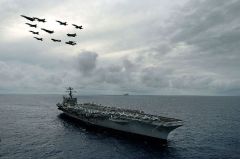 diplomatieke traject te doen slagen, zoals ook wordt beweerd door een anonieme diplomaat in een recent artikel in Newsweek: 'The idea was to periodically float the possibility of war in public comments in order to keep Iran off balance. In truth, the official said, no war preparations are underway.' Keuze twee: de constante dreiging is de harde realiteit die naar voren mag komen zodra het praatje voor de vaak is gehouden en is gebleken dat het diplomatieke traject, zoals was te verwachten, heeft gefaald. In het eerste scenario heeft men de sterke hand van de militaire slagkracht als pressiemiddel bij het doel de diplomatiek te laten slagen, in het andere scenario is de diplomatiek een rookgordijn en het eerste, niet-fysieke deel van de aanval, net als bij de opbouw naar de oorlog met Irak. Zie ook de video die ik maakte over de overeenkomsten tussen de opbouw van de oorlog met Irak en de mogelijk komende oorlog met Iran. diplomatieke traject te doen slagen, zoals ook wordt beweerd door een anonieme diplomaat in een recent artikel in Newsweek: 'The idea was to periodically float the possibility of war in public comments in order to keep Iran off balance. In truth, the official said, no war preparations are underway.' Keuze twee: de constante dreiging is de harde realiteit die naar voren mag komen zodra het praatje voor de vaak is gehouden en is gebleken dat het diplomatieke traject, zoals was te verwachten, heeft gefaald. In het eerste scenario heeft men de sterke hand van de militaire slagkracht als pressiemiddel bij het doel de diplomatiek te laten slagen, in het andere scenario is de diplomatiek een rookgordijn en het eerste, niet-fysieke deel van de aanval, net als bij de opbouw naar de oorlog met Irak. Zie ook de video die ik maakte over de overeenkomsten tussen de opbouw van de oorlog met Irak en de mogelijk komende oorlog met Iran.Aan de research voor dit artikel is bijgedragen door Willem Grooters en Hans Sanou.
DeepJournal
Sign up for the free mailing list. |
|
9 September 2013
Why is Syria under attack? - Part 4
‘Syria’ is about power, money, influence and energy
8 September 2013
Why is Syria under attack? - 3
Syria and Iran are like pieces on a geopolitical chessboard
7 September 2013
Why is Syria under attack? - Part 2
On the interests of the parties involved in the Syrian conflict and the role of the media
6 September 2013
Why is Syria under attack? - Part 1
Who is behind the chemical weapons attack in Syria?
1 April 2013
Albert Spits: Creëer je eigen financiële veiligheid
Beluister het interview
|



